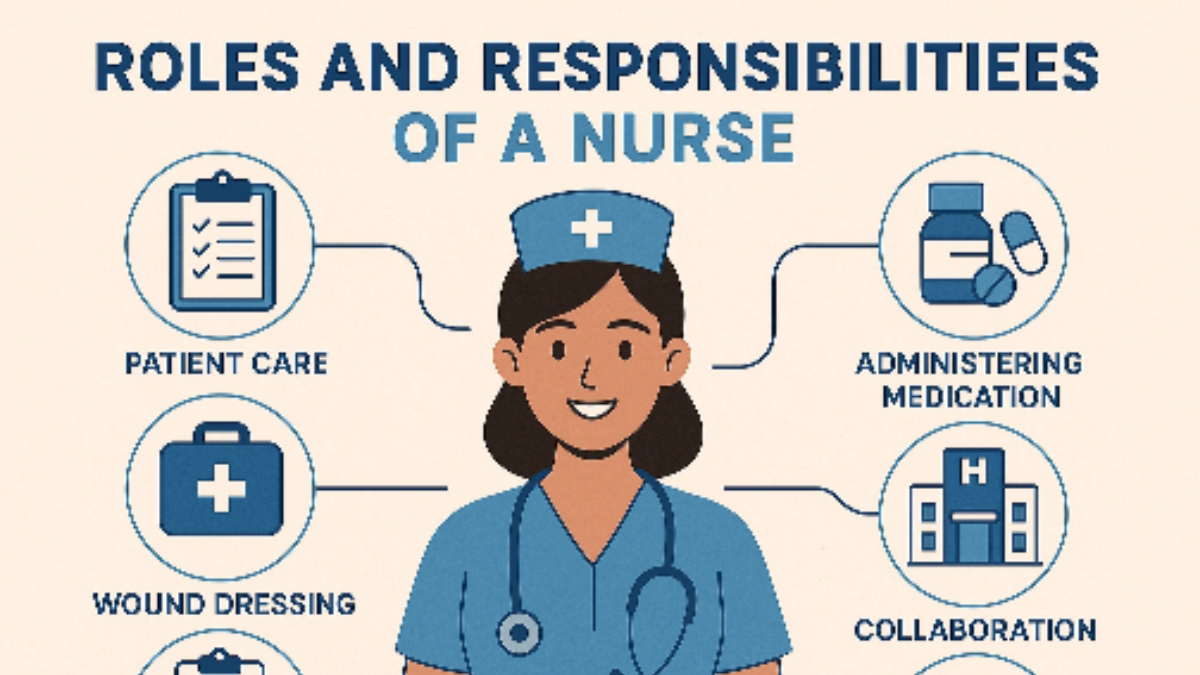Nurses form the backbone of hospital care. While doctors diagnose and prescribe treatment, it is nurses who provide continuous care, support, and monitoring to patients. Their role goes beyond medical assistance—they also provide emotional support, ensure patient comfort, and bridge communication between doctors, patients, and families. Without nurses, hospitals cannot function smoothly.
Importance of Nurses in Healthcare
- Continuous Care: Nurses provide 24/7 patient care and supervision.
- Emotional Support: They offer comfort and counseling during stressful times.
- Bridge Between Doctor and Patient: Nurses explain treatment plans and ensure they are followed.
- Patient Safety: By monitoring vital signs and medication, nurses prevent complications.
- Hospital Efficiency: Nurses manage wards, coordinate with other staff, and maintain patient records.
Key Responsibilities of Nurses
1. Patient Care and Monitoring
- Checking vital signs like blood pressure, temperature, and heart rate.
- Observing symptoms and reporting them to doctors.
- Administering medications and ensuring correct dosages.
2. Assistance in Medical Procedures
- Helping doctors during surgeries, operations, and emergency treatments.
- Preparing medical instruments and ensuring hygiene in operating rooms.
- Assisting in diagnostic tests and dressing wounds.
3. Medication Management
- Dispensing prescribed medicines on time.
- Educating patients about medication use and side effects.
- Preventing errors by cross-checking prescriptions.
4. Emotional and Psychological Support
- Talking with patients to reduce stress and anxiety.
- Providing reassurance during painful procedures.
- Supporting families with information and guidance.
5. Health Education
- Educating patients about diet, lifestyle, and exercise.
- Advising families on post-hospital care.
- Teaching patients how to manage chronic illnesses at home.
6. Infection Control
- Maintaining hospital hygiene and cleanliness.
- Ensuring proper sterilization of equipment.
- Following strict hand hygiene and safety protocols.
7. Emergency Response
- Handling trauma, accidents, and critical cases.
- Performing CPR and life-saving techniques.
- Quickly responding to sudden changes in patient condition.
Types of Nurses in Hospitals
- Registered Nurses (RNs): Provide general hospital care and patient management.
- Surgical Nurses: Assist in operations and surgeries.
- Pediatric Nurses: Specialize in children’s health and newborn care.
- ICU Nurses: Care for critically ill patients in intensive care units.
- Emergency Nurses: Work in emergency departments to handle urgent cases.
- Oncology Nurses: Care for cancer patients during chemotherapy and radiation.
- Psychiatric Nurses: Support patients with mental health issues.
- Community Health Nurses: Educate and care for people outside hospitals.
Skills Required by Nurses
- Compassion and Empathy: Essential for patient interaction.
- Strong Communication Skills: To explain procedures and instructions clearly.
- Critical Thinking: To make quick decisions during emergencies.
- Technical Knowledge: Handling equipment, injections, and medical devices.
- Patience and Stamina: Managing long shifts and challenging patients.
Challenges Faced by Nurses
- Long working hours and physical exhaustion.
- Emotional stress from dealing with critical patients.
- Risk of infections and exposure to diseases.
- Balancing multiple responsibilities in busy hospitals.
- Limited recognition despite their crucial role.
Contribution of Nurses to Patient Recovery
Nurses play a direct role in patient healing:
- Ensuring patients follow prescribed treatments.
- Providing nutritional advice and physical support.
- Motivating patients during recovery and rehabilitation.
- Monitoring progress and reporting improvements to doctors.
FAQs About Role of Nurses in Hospitals
1. Why are nurses important in hospitals?
Nurses provide continuous care, monitor patients, and support doctors, making them essential for healthcare delivery.
2. What is the difference between a doctor and a nurse?
Doctors diagnose and prescribe treatment, while nurses implement and monitor care.
3. Do nurses only work in wards?
No, nurses work in ICUs, emergency rooms, operating theaters, outpatient departments, and community health centers.
4. Can nurses give medication?
Yes, nurses administer medications as prescribed by doctors.
5. How do nurses support patients emotionally?
By offering comfort, reassurance, and clear communication during stressful times.
6. What training do nurses undergo?
They complete nursing degrees or diplomas and receive specialized training in patient care.
7. Are nurses part of surgical teams?
Yes, surgical nurses assist doctors in operations and ensure sterile conditions.
8. How do nurses prevent infections in hospitals?
Through sterilization, hygiene practices, and following infection control protocols.
9. Can nurses handle emergencies?
Yes, trained nurses provide first aid, CPR, and emergency care.
10. Do nurses also educate patients?
Yes, nurses guide patients and families on diet, lifestyle, and managing health at home.

